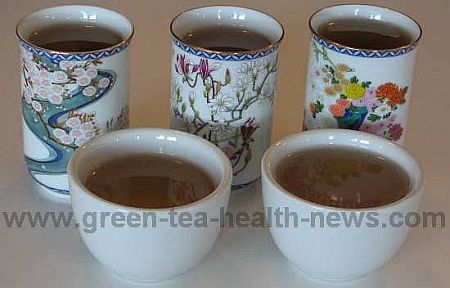Prostate Cancer Research On Green Tea

Prostate cancer research shows new metabolic results
According to the U. S. National Cancer Institute, a strong focus of prostate cancer research is on dietary influences.
Since there are clear differences in prostate cancer incidence among men with habitual dietary choices (such as a high fat diet associated with more prostate cancer), there is hope that research can identify dietary changes associated with increased or decreased prostate cancer.
One metabolic difference associated with less prostate cancer is equol production.
What is an equol producer?
Early research with Japanese men showed that men with larger amounts of equol in their blood from their diets, or from the metabolic capacity to produce equol from diadzein (an isoflavone) had significantly lower rates of prostate cancer.
The men who had low equol in their blood or were non-equol producers had higher rates of prostate cancer.
Both green tea and soybeans are associated with increased equol production
In a hospital-based case controlled study, researchers in Japan studied both blood levels of equol and dietary habits of men with prostate cancer and similar men who were free of prostate cancer.
The group who were free of prostate cancer had approximately 50% more equol producers than the cancer group, a statistically significant difference.
The equol producers consumed an significantly higher amount of daily green tea and soybeans than the prostate cancer group. (Miyanaga, 2003)
A possible explanation for these results involve hormone metabolism in prostate cancer.
Both green tea and soy have been shown to interact with androgen receptors in the prostate and may prove to be important in hormone prostate cancer.
Added value with daily green tea
Thousands of studies have shown that daily green tea not only helps reduce the risk of prostate cancer, it also helps reduce the risk of other cancers, protects the brain, decreases heart attack risk, and helps the immune system.
While dietary prostate cancer research is still preliminary, the new information on equol production may help explain the low prostate cancer rates in men who consume green tea and soybeans.
Always check with your licensed health care provider for early detection.
Can you really buy that doctor's guide to prostate cancer book for $0.01?
Related prostate cancer research articles:
HG-PIN prostate cancer green tea research shows 90% less cancers
Overall prostate cancer green tea research shows up to 91% risk reduction
More health info with free subscription to the Green Tea Health Newsletter here:
Social Networking
Are you a member of a social networking site like Facebook, Google +, or the popular Twitter? If you like my website, share it with your friends and family! I appreciate it also, and thank you in advance.
http://www.green-tea-health-news.com/prostate-cancer-research.html
This page last updated by Sharon Jones.
Was this page on prostate cancer research helpful? Here's more health info
More Tea And Goodies
Subscribe to the free e-zine, Green Tea Health News for free ebook offers, link archives, helpful products, hot deals, and more.Subscribe now and don't miss a single issue.
This website supports
planting Giant Sequoia trees.Find out more!

